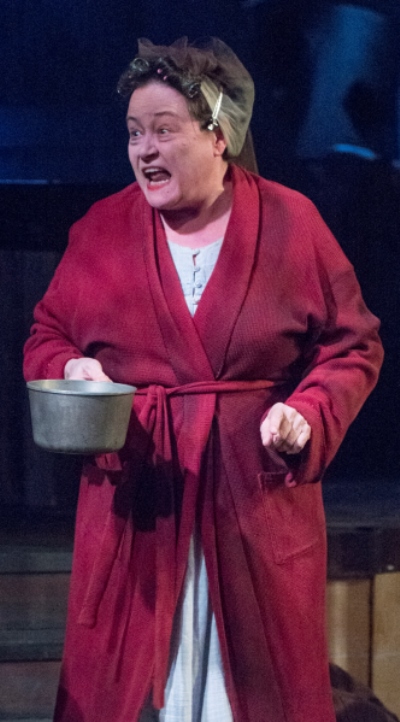Raven Theatre’s sharp image of ‘Vieux Carré’ evokes turning point for playwright Williams
 Review: “Vieux Carré” by Tennessee Williams, at Raven Theatre through June 28. ★★★★
Review: “Vieux Carré” by Tennessee Williams, at Raven Theatre through June 28. ★★★★
By Lawrence B. Johnson
Raven Theatre’s very fine production of Tennessee Williams’ “Vieux Carré” bespeaks that lyrical playwright in the long, sad twilight of his creative career and, indeed, his life. It is a look back into the predawn of Williams’ emergence as an important voice, a play filled with rich characters of meager means, and the lean, fierce eloquence of this account directed by Cody Estle gets it wonderfully right.
 With “Vieux Carré” (1977), Williams returned autobiographically to the actual address of a down-at-the-heels rooming house in New Orlean’s French Quarter where in 1939, not quite 30 years old, he found himself piled together with a band of the similarly luckless. Five years later, Williams would produce his first major success, “The Glass Menagerie” – to be followed over the next decade by “A Streetcar Named Desire,” “Summer and Smoke,” “The Rose Tattoo,” “Camino Real” and “Cat on a Hot Tin Roof.”
With “Vieux Carré” (1977), Williams returned autobiographically to the actual address of a down-at-the-heels rooming house in New Orlean’s French Quarter where in 1939, not quite 30 years old, he found himself piled together with a band of the similarly luckless. Five years later, Williams would produce his first major success, “The Glass Menagerie” – to be followed over the next decade by “A Streetcar Named Desire,” “Summer and Smoke,” “The Rose Tattoo,” “Camino Real” and “Cat on a Hot Tin Roof.”
But during his brief stay at 722 Toulouse St. in the Vieux Carré (literally, the old quarter), Tennessee Williams was simply trying to figure himself out, as a playwright and as a man in the world. Like “The Glass Menagerie,” “Vieux Carré” is a memory play, but in this case the story-teller is Williams himself, whom he calls the Writer. While things happen to him – he comes fully to terms with his homosexuality – the Writer’s interest (and thus ours) lies mostly in what he observes: real life in all its passion, disappointment, pretense, sorrow and unadorned honesty.
 The occupants of 722 Toulouse St. – recreated in designer Ray Toler’s multi-room dwelling of detailed decay — are a lusty, over-ripe lot: earthy creatures of a hot, sultry clime; stray sheep tended with casual and ineffectual belligerence by the landlady Mrs. Wire. Lady, indeed. JoAnn Montemurro’s screaming, scheming, snooping Mrs. Wire is the converged incarnation of paranoia and misanthropy.
The occupants of 722 Toulouse St. – recreated in designer Ray Toler’s multi-room dwelling of detailed decay — are a lusty, over-ripe lot: earthy creatures of a hot, sultry clime; stray sheep tended with casual and ineffectual belligerence by the landlady Mrs. Wire. Lady, indeed. JoAnn Montemurro’s screaming, scheming, snooping Mrs. Wire is the converged incarnation of paranoia and misanthropy.
She sleeps (lightly, and with a flashlight) in the front hall, the better to monitor the comings and goings of her tenants. Her temper’s in perpetual simmer and, when sufficiently provoked by the unsavory behavior of her residents, known to boil over. Yet there are traces of gold in that black heart, and the old woman has a soft spot for the Writer (if only because she confuses him with her departed son). In this place of torment and suspended dreams, Montemurro brilliantly mercurial performance taps deeply into a demonic minder of souls.
If the technique of “Vieux Carré” recalls “The Glass Menagerie,” its form and content harken back to the existential limbo of “Camino Real.” Here, life is sustained by self-deception, death hovers and flight is rare. Everyone is temporarily impecunious – like the middle-aged artist Nightingale, a melancholy but generous spirited painter of cheap portraits who inhabits the room next to the Writer. As the slowly disintegrating Nightingale (who prefers to call himself by the more aristocratic-sounding French name Rossignol), Will Casey gives a performance as radiant as it is despairing.
 The most fetching of these unhappy few is Jane, a well-educated Eastern girl who’s not quite sure how she ended up in this dump, and in the clutches of a rough-cut sex machine called Tye. Eliza Stoughton’s lovely, gentle, lost Jane stands – and frequently reposes – in stunning contrast to Joel Reitsma’s arrestingly brutish Tye. Alcoholic, drugged-out Tye serves one purpose for Jane, and he fills that position (rather, several as we observe) with singular devotion. Sex, in its sundry forms both consensual and imposed, is portrayed throughout the play with graphic similitude.
The most fetching of these unhappy few is Jane, a well-educated Eastern girl who’s not quite sure how she ended up in this dump, and in the clutches of a rough-cut sex machine called Tye. Eliza Stoughton’s lovely, gentle, lost Jane stands – and frequently reposes – in stunning contrast to Joel Reitsma’s arrestingly brutish Tye. Alcoholic, drugged-out Tye serves one purpose for Jane, and he fills that position (rather, several as we observe) with singular devotion. Sex, in its sundry forms both consensual and imposed, is portrayed throughout the play with graphic similitude.
Such is the human landscape surveyed by the keenly attuned Writer, the refuse heap from which he plucks the bits and pieces that will be recombined into collages of the human comedy. Ty Olwin brings to the Writer a satisfying mix of naïveté, vulnerability and ultimate creative clarity. He, among all these miscreants, is the one just passing through. He needs only a ticket out; and lo, the bearer cometh.
Related Link:
- Performance location, dates and times: Details at TheatreinChicago.com
Tags: Cody Estle, Eliza Stoughton, JoAnn Montemurro, Joel Reitsma, Raven Theatre, Ray Toler, Tennessee Williams, Ty Olwin, Vieux Carré, Will Casey











